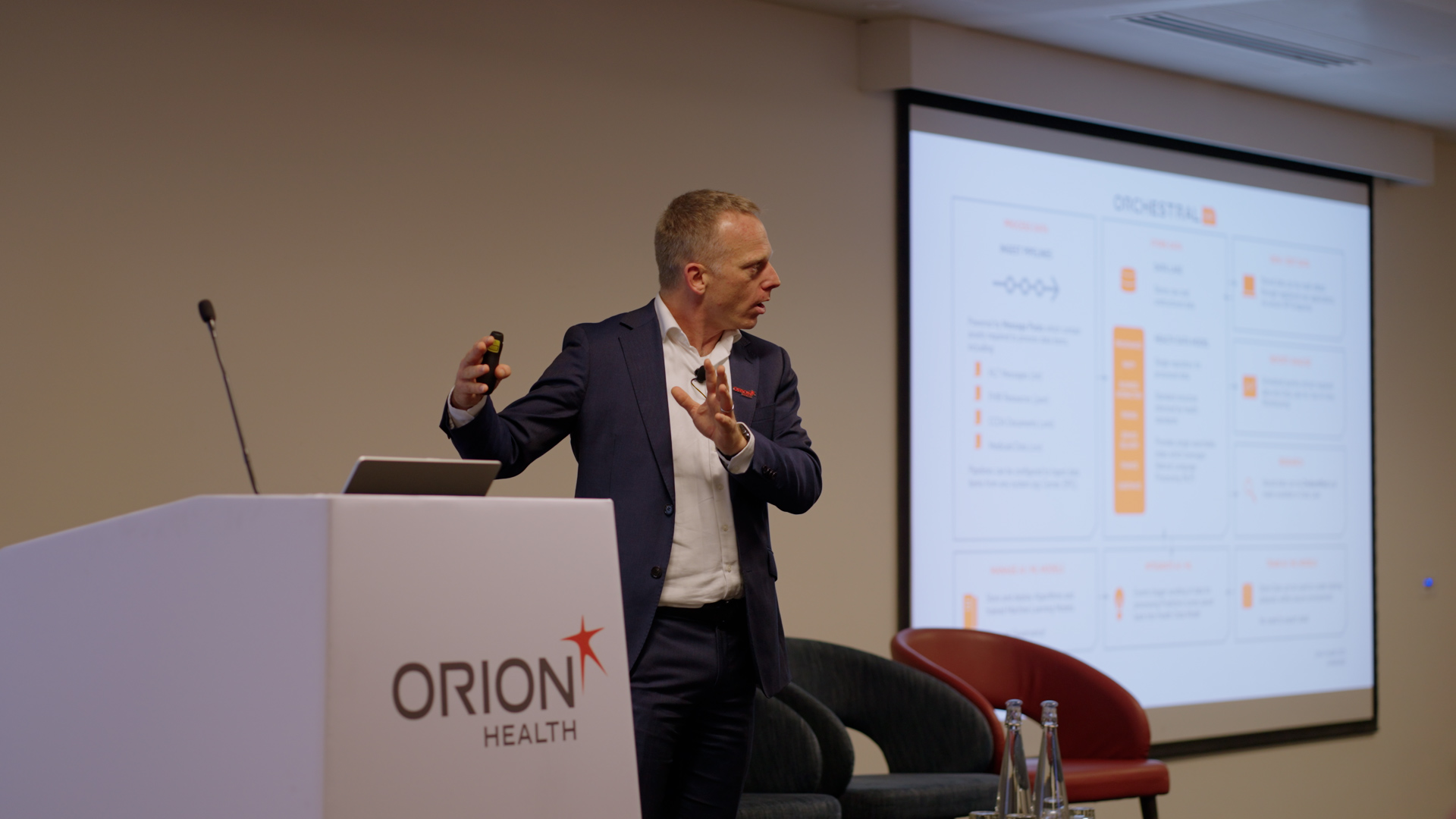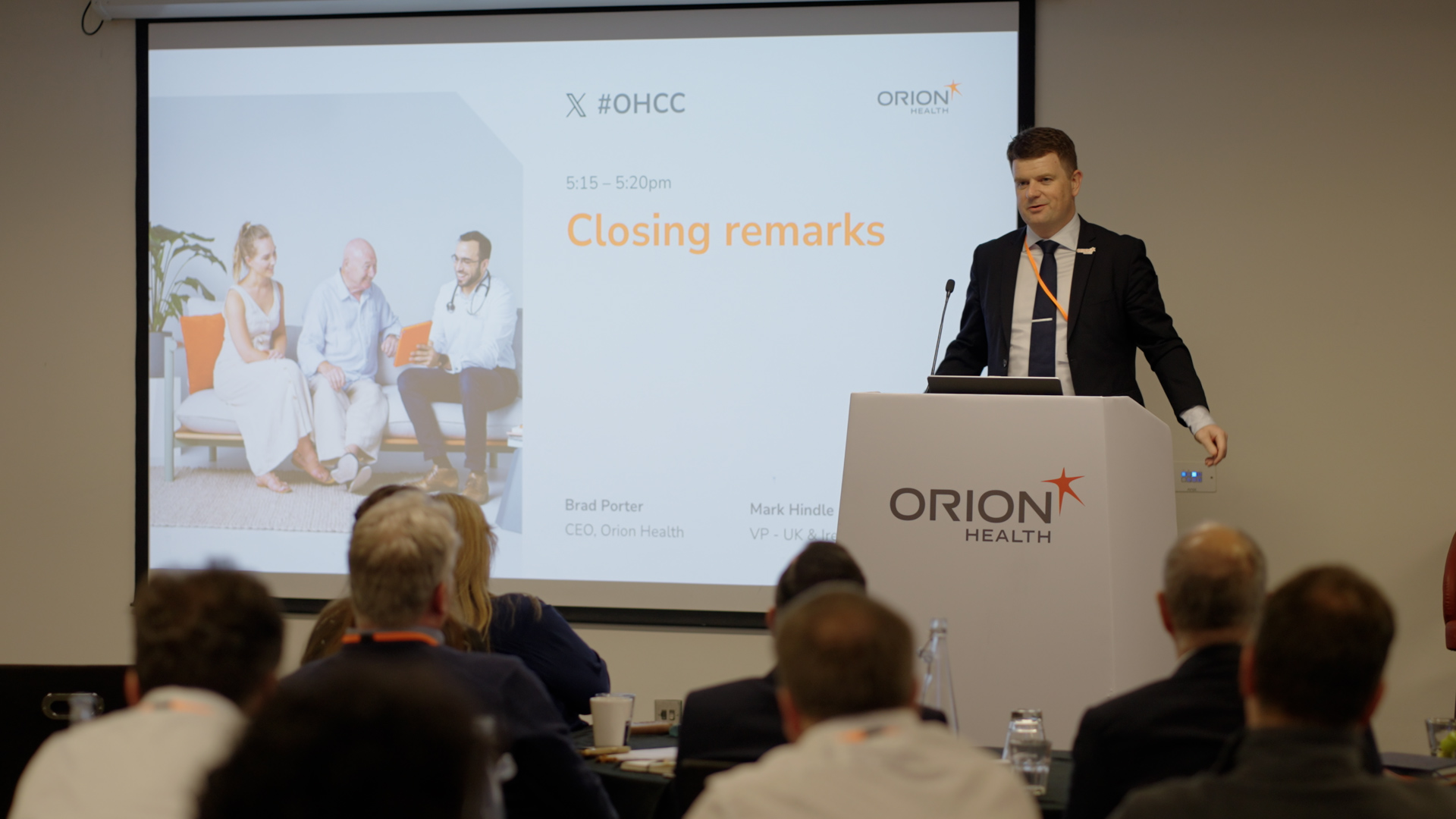Orion Health’s UK and Ireland Customer Conference 2023 opened with a breakfast discussion about “mind-blowing tech” led by Dr Raphael Olaiya. The GP, researcher, and thought leader has a particular interest in virtual reality and AI, but he argued that “mind-blowing” technology isn’t about futuristic thinking; it’s about scale and application.
“A lot of research is focused on ideas that are not applicable to the masses, but to the few people who can afford it,” he said. “We see a lot of technology that has been around for years that has not been scaled, because while the technology itself might be fine, it can’t be applied where it is needed.”
With this in mind, Dr Olaiya’s list of “monumental” technologies included wearable devices that enable patients to monitor their own conditions; apps to help them take control of their health; digital platforms to improve access to medicine; communication tools to support multi-disciplinary teams; and decision- support tools to put the latest thinking into the hands of clinicians.
Solid foundations in the shared care record
Orion Health is already working in some of these areas. Its technology underpins nine of England’s shared care records, which are creating a longitudinal record of the demographic and key medical details of more than 20 million people and putting it into the hands of health and, increasingly, social care professionals at the point of care.
The conference heard that NHS England is encouraging SCRs to build on these foundations by adding new functionality, such as care plans to help MDTs support people with chronic conditions or nearing end-of-life, or portals, to open-up access to patients.
While, internationally, Orion Health has developed a digital front door concept aimed at making Ontario’s healthcare system truly “digital first.” However, Orion Health’s ambition is to make sure that integrated care systems and trusts can use the data in the shared care record to address some of the challenges they are facing.
Or, as Martin Curley, professor of innovation at Maynooth University, put it: to stay left and shift left in a world in which demand is growing but funding and staff numbers are shrinking. “We need to stay left – which means keeping people well as a start” – and shift left – which means that if they are ill we try to keep them in the community,” he said.
“It is ten times more expensive to have someone get ill than to keep them well, or to treat them in hospital when we could treat them at home. We need to shift left from illness to wellness, activity to outcome, systems to people.”

Global challenges, global interest in AI to tackle them
Orion Health chief executive Brad Porter told the conference this will mean taking the vast amount of data that healthcare generates every day and applying the latest data analytics and AI techniques to it. This will include machine learning – in which algorithms teach themselves – and generative AI – in which algorithms create new material.
“Orion Health works in 12 countries, and everywhere I go I hear that healthcare is broken,” he said. “I don’t think it is broken, but I think it is disorganised. We need to use data to get it organised, and to get
it organised in the right way.”
Although barely a day goes by without a traditional or social media report on AI and the potential of products like ChatGPT, it isn’t much used in healthcare – yet. Porter said it will take time to: “Build trust, make sure we are using the right data sets, avoid human biases, and ensure equity and inclusion.”
But he insisted that “while there are lots of questions to be answered, a future powered by AI is exciting” and: “We should be using AI to address population health challenges, to decide who to send into hospital, to tackle administration, and to make personalised healthcare the norm.”
The Unified Healthcare Platform with Orchestral at its heart
Orion Health has just launched a Unified Healthcare Platform to underpin its Amadeus Digital Care Record, Virtuoso Digital Front Door, and Orchestral Health Intelligence Platform. Orchestral has evolved out of work undertaken by Precision Driven Health, a seven-year collaboration between Orion Health and more than 50 universities, healthcare bodies, and partners, to use data to develop new healthcare tools.
Its algorithms are now used across New Zealand and globally, but Dr Kevin Ross, Orion Health’s SVP for product enablement, argued Orchestral will move data use “into the next generation.” “At the moment, there is a lot of data coming in, and we all know we should be doing something with it, but we are not sure what, while AI is coming towards us,” he said.
“I am sure you have all tried something like ChatGPT and been awed or scared depending on what you have done with it. But it is going to be game-changing, so we need to think about how we can use it to unlock the value of that data, securely and safely. And we have technology that can help.”
Orchestral helps by ingesting data that has been collected by different healthcare organisations, using different systems, formats, and standards. It stores this information against a data model with a standard structure which means it can be safely exported to off-the-shelf business and research analytics packages.
At the same time, it includes some specific tools to ensure the confidentiality and integrity of healthcare data, such as a de-identification tool to suppress, mask or randomise data items for research, a data monitor to look for data quality issues, and a smart code to clinically code free text and make it easier to search.

Harnessing the power of generative AI with Pieces
In addition, Dr Ross said Orion Health is doing a lot of work on natural language models. For example: “Ontario realised that patients needed a way to interact with the system without searching through documents,” he said. The result is “a chatbot that remembers where you were in a conversation if you leave and come back again, so you are not starting from scratch.” Another example: Orion Health has formed a partnership with Pieces, a US company that started out by working with Dallas’ healthcare system to create what Dr Ross described as a “tweet-level summary” of a healthcare interaction. This can be sent to clinicians or patients, to give them a rapid overview of an encounter, without working through pages of medical records or results.
“All of these things are possible today,” he said, “although we do need to think carefully about the clinical safety element. We are worried about hallucinations. And we are working to make sure the guidance we are developing is consistent and in line with best practice.”
AI can also tackle ‘data waterboarding’
Back at the breakfast meeting, there was a lively discussion around some of the potential challenges posed by the new world of data, analysis, and tools that platforms like Orchestral will make possible. Dr Olaiya argued that tools that give MDTs access to the full patient history and map in the latest pathways, guidance, and research on treatment, will be “mind-blowing.”
But there’s a danger they could blow minds. As Dr Phil Koczan, a GP, national and London tech leader, put it: “As a GP, I understand that having lots of information in the summary care record is a good step forward, but we are starting to get what is sometimes called ‘data waterboarding.’ We are being deluged with data, just as we are seeing a general increase in workload.”
Orion Health CEO Brad Porter argued that the partnership with Pieces could help here, by “condensing the information in the longitudinal record into a usable, 140-word form.” Similarly, there was concern that patients would be overwhelmed by data and put more pressure on the healthcare system as they look for help in interpreting it.
Again, Porter felt AI would help. “We sometimes talk about the worried well, but all the evidence from Ontario and other places is that if people are given more information, they are more proactive and less anxious,” he said. “I am more interested in where data is going in the system.
“If we are remotely monitoring someone, for example, we could be sending data to three places [the patient, the monitoring team, and a GP or consultant]. Generative AI can help here because we can use it to create summaries, clarify our pathways, and build dashboards, so clinicians only see what they want to see.
“That is what hospital clinicians like about the big electronic patient records: all the data is in front of them, but they have some control over how they access it. That’s different from standing under the waterfall, and we can achieve that by building out our data capabilities from the shared care record.”
